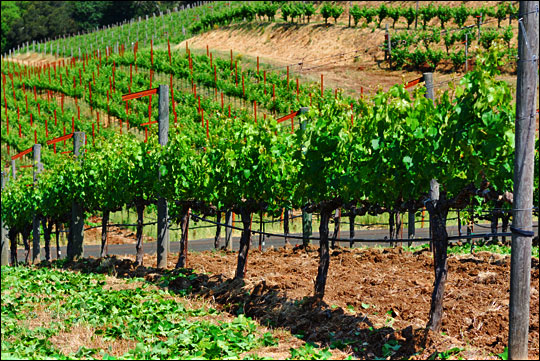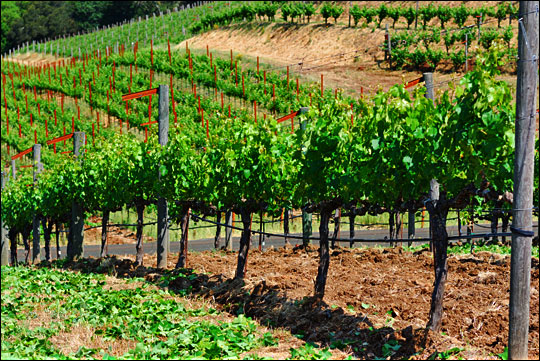In Checkout Line, Lou Bendrick cooks up answers to reader questions about how to green their food choices and other diet-related quandaries. Lettuce know what food worries keep you up at night.

Dear Checkout Line,
What the hell is biodynamic wine and does it taste any better than regular wine?
Jeff
Colorado
Dear Colorado Jeff,
I appreciate the way you get to a point fast, so I’ll try to do the same. This is unlikely, given my digressive style, but who knows — optimism is back in style in America once again.
The wine of which you speak is made from grapes that were grown in accordance with biodynamic farming practices, which are based on the ideas of Austrian philosopher Rudolf Steiner (whose theories also gave birth to today’s Waldorf schools). These wines meet organic standards, but they get Super-Extra Bonus Points in terms of sustainability. BD farmers are strict and meticulous stewards of their land, which they tend to view as a single, living organism (a sort of Gaia hypothesis in micro).
They are likely to make their own soil treatments such as the infamous manure-filled ram’s horn, and they believe that a good wine “starts with compost.” Their approach is decidedly holistic and unconventional: Farming is influenced not only by the seasons, but also by lunar and planetary phases. For more info, go here.
Does it sound a bit eccentric to you? It certainly did to me, but I had to ask myself which was nuttier: the intensively farmed, sprayed, and irrigated monocultures of conventional winemaking, or super-dedicated organic farming with a dash of mysticism?
Critics of BD wine dismiss it as witchcraft. This has been countered by pointing out that many God-fearing folks turn to the all-American Farmer’s Almanac for their astrological-gardening tips.
And, nutty or not, more and more consumers are turning to organic and BD wines, and not just for sustainability, but also for taste. Check out this article in Fortune magazine, where BD wines came out winners in a blind taste test.
Now let’s talk for a moment about the “regular” wines you mentioned. Wine is an agricultural product, involving grapes grown in a field (viticulture). And it’s also a manufactured product: Someone crushes grapes and turns the juice into an alcoholic beverage (winemaking).
Critics of conventional winemaking say that modern wine is like fast food: quickly made (thanks to technology such as micro-oxygenation), highly processed (with all manner of additives, lab-made yeasts, and wood chips), and when it comes to flavor, predictably boring (fruit-forward, with lots of oak, resulting in vanilla flavors).
If you’re interested in the subject of the globalization and homogenization of wine, check out the most excellent documentary Mondovino. Disclosure: It’s long and subtitled. Bring wine. And cheese. And a neck pillow.
To counter McWine, there is a small-is-beautiful artisan wine movement afoot, and many of these young, passionate vigenerons are biodynamic farmers. They toss around buzzwords like “natural,” “authentic,” and “old world,” and control the whole process from vine to verre (glass).
These grower/winemakers shun chemicals and heavy filtration, embracing instead wild yeasts, hand-harvesting, and lower yields. Some of them even dare to go sulfur-free, which is akin to raising racehorses without anabolic steroids (in other words, difficult, respectable, and against-the-grain … mavericky.) To learn more about “natural wine,” go here. Fans of these wines say that they are better able to express the specific place from whence they came (a quality known by the French phrase terroir).
I called wine critic Alice Feiring, author of the fun book The Battle for Love and Wine: or How I Save the World from Parkerization (reviewed by Grist’s own Tom Philpott here) and asked her what people could expect from a natural wine. Especially people like me, whose wine palates were formed on the jammy and oak-y New World wines.
“If they are really looking for fruit, fruit, fruit, they have to be prepared for the fruit, fruit, fruit to take a backseat to something more subtle,” she told me. “Basically, they will have to listen a lot more to the wine. There will be much more complexity. It might shock them enough to make them laugh.”
In the spirit of adventure, laughter, and new optimism, my husband and I recently opened a bottle of natural and biodynamic French wine called Nicolas Joly Savennieres Les Clos Sacres 2005. (The winery’s proprietor is the author of a well-regarded book on biodynamic wine.) The wine was lovely and golden. I thought I tasted flowers; my husband used the word “mineral.” It simply didn’t taste like other wines. It reminded me of my experience with micro-batch bean-to-bar chocolate: not subtle or comfortingly familiar, but intense and exciting! (I do realize that sounds like the wine equivalent of a trip to Vegas. The wild yeasts must be to blame.)
Finding natural wines can be a smidge tricky; I special-ordered mine from my local wine store. Are you a traveling man, Jeff? Feiring suggests that the next time you are in the Bay Area, go to Terroir Natural Wine Merchant & Bar. Or look for the label of wine importers like Louis/Dressner Selections and Rosenthal Wine Merchant, which seek out all manner of “natural” wines, including biodynamic ones. There’s also more info on Feiring’s website.
Let me note that if you’re a fruit-forward guy, no problem. There are plenty of modern-style wines from biodynamically grown grapes. And while it is true that a bottle of a BD wine will generally be more expensive than a bottle of Yellowtail, there are affordable ones, too. To get the real stuff, Feiring recommends that you look for the term “biodynamic wine” on the label. You can also look for biodynamic certification by Demeter and Biodivin (a French agency).
I’ll leave you with an appropriate French toast: A votre sante, or “to your health.” (Clink!)
Naturally, authentically, and biodynamically yours,
Lou



